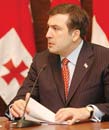|
Thursday,
July 19,
2007, #136 (1403)
 Tbilisi Moves on South Ossetia Status Determination Tbilisi Moves on South Ossetia Status Determination
By Eter Tsotniashvili

No sides in South
Ossetia says
Saakashvili |
“There is no ‘Ossetian’ or ‘Georgian’ side, nor ‘Ossetian’ and ‘Georgian’ villages—there’s only the temporary administrative unit in Ossetia,” President Saakashvili told government members July 18, on the back of the president’s order last week for a commission to determine South Ossetia’s status within the Georgian state.
The separatist territory has been offered broad autonomy within Georgia, but its precise de jure status is not defined.
The commission, the president said, is to be chaired by Prime Minister Zurab Noghaideli and will talk with Dmitry Sanakoyev, head of the Tbilisi-backed provisional administration unit in Kurta, as well as others to determine the region’s status.
“These will be serious negotiations. These will not be just formal talks, because our partners are serious people, serious leaders and serious representatives of one part of the Georgian population: a large part of ethnic Ossetians,” he said, referring to Sanakoyev’s administration.
Saakashvili urged politicians to refrain from referring to the ‘Georgian side’ and ‘Ossetian side’ in the South Ossetian conflict region. “Everyone should erase these terms from their vocabularies,” he said.
“If there were an ‘Ossetian side,’ it would be the provisional administration, which represents the local population…In Tskhinvali, the majority are not ethnic Ossetians. We know very well from where the rest of the people have been resettled. Some of Tskhinvali’s population may have Ossetian last names, but they have nothing in common with the Ossetian people,” the president said.
Saakashvili did not specify a date for the commission’s creation, but his statements from his cabinet implied it would be soon. Tbilisi is extending broad invitations to participate in the commission, saying there is room for government representatives, ruling and opposition party lawmakers—and separatist Tskhinvali officials.
Head of the State Chancellery Petre Mamradze said the process would include “an all-inclusive dialogue” with all South Ossetian communities.
Sanakoyev earlier broached the status-definition question at a July 3 international conference in Batumi. Sanakoyev told EU representatives there that his administration had already begun settling on a legal status for the region.
President Saakashvili also called for international organizations to assist in settling the conflict.
“International society must take part in conflict regulation issues. Successes achieved, like in the Tskhinvali region, must also be attained in other Georgian conflict zones,” Saakashvili said.
Tbilisi officials must also do their part, he said.
“There are many things to do, but we lack time,” the president told his cabinet, requesting that they be more active in conflict resolution efforts. “We must work night and day…there is a battle for people’s hearts,” he declared.
Sanakoyev welcomed Saakashvili’s remarks.
“This step distinguishes the autonomy and status of South Ossetia, in which society develops and feels themselves as respected residents. It’s very important for the residents of Ossetia to have equal rights to the residents of Georgia,” Sanakoyev commented.
There was no immediate reaction from the de facto Tskhinvali authorities.
The South Ossetian status commission flies against the recommendations of a widely-read International Crisis Group report released in early June.
“[Georgia should] focus on restoring territorial integrity through gradual confidence building, not rapid status determination,” the report advised.


© The Messenger. All
rights reserved. Please read our disclaimer
before using any of the published materials. |